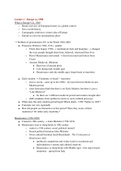College aantekeningen
Early Modern History Class/Lectures Notes - The European World
- Instelling
- Rijksuniversiteit Groningen (RuG)
A complete and in-depth summary of all the lectures (week 1 to 7) of the course of Early Modern History. My exam grade: 8.3
[Meer zien]





